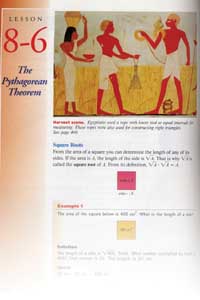University mathematicians part of NSF math curriculum project
By William HarmsNews Office
 |
Mathematics educators at the University will be working with colleagues around the country to improve mathematics curricula as part of a new national effort to boost learning in mathematics and science.
The National Science Foundation has given the University of Chicago School Mathematics Project a $500,000, five-year grant as part of the foundation’s $30 million Centers for Learning and Teaching initiative.
UCSMP researchers will work with faculty who are part of a multi-institutional effort, which has created the Center for the Study of Mathematics Curriculum to be launched Jan. 1, 2004. This center is one of three the NSF has established, and it joins 15 others under the umbrella of the Centers for Learning and Teaching, which specialize in issues of elementary and secondary education and higher education.
“The Center for the Study of Mathematics Curriculum will prepare a coordinated plan to develop curriculum leadership and undertake scholarly inquiry related to mathematics curriculum,” said Zalman Usiskin, Professor in Education and Director of the UCSMP.
In addition to UCSMP, other partners in the center are Michigan State University, the University of Missouri, Western Michigan University, Horizon Research, Inc., and a number of school districts in Michigan and Missouri.
Researchers with UCSMP will oversee the development of a graduate-level monograph series, participate in leadership and advisory board meetings, and organize conferences on mathematics curricula.
Part of the work of the center will be the development of leaders in mathematics curricula through work with Ph.D. students who specialize in that area. The monograph series will provide a focused mathematics curriculum to use in graduate coursework in mathematics education. Course material in the area is idiosyncratic, Usiskin said.
“Although a sequence of courses that works for professors in one institution will not necessarily work for professors elsewhere, it is worthwhile for professors to have a great deal of guidance as they construct their own courses,” he explained.
“One idea is to take a particularly small area, such as the definition of a quadrilateral, and see how its description has changed over time,” Usiskin said. “That way people who are developing curriculum can learn to be more flexible.”
A national and international conference series will help establish a community of curriculum scholars, Usiskin said, and will bring together a wide range of people including authors, researchers and representatives of ministries of education. “These conferences will be organized around major mathematics content strands, such as algebra, geometry, statistics and probability, and numbers and operations,” Usiskin said.
The monograph series, as well as the conference series, will be a primary means of disseminating information about the center.
UCSMP, founded in 1983, is the nation’s largest university-based mathematics education project. In addition to developing a very successful textbook series, UCSMP has organized four successful international conferences.
![[Chronicle]](/images/sidebar_header_oct06.gif)